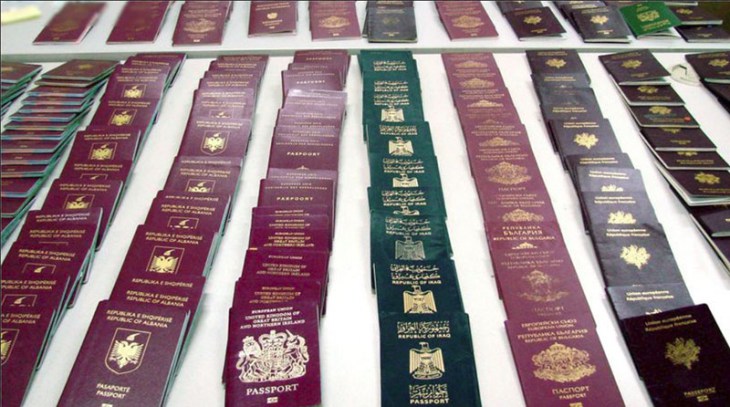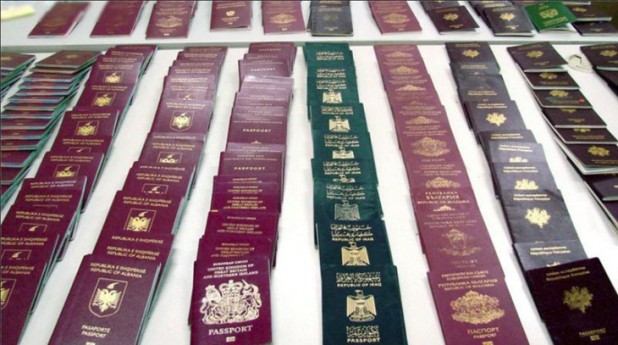The New Observer
December 6, 2015
Nonwhite “immigrants” who are legally resident in Europe are behind the mass manufacture of fake passports and other documents, and use a network of contacts which include people living inside ISIS-occupied Syria, and commercial printers in China, to produce forged papers used by “refugees,” it has emerged.
A comprehensive study of the fake passport scam being used to enable the current mass nonwhite invasion of Europe was undertaken by the Greek news service Kathimerini under the heading “Forged identity papers big business for traffickers in Greece,” (Nov. 30, 2015).
It was then republished in the major German newspaper Die Zeit, who ran it under the heading “You can buy a Syrian passport at the kiosk” (“Syrische Pässe kauft man am Kiosk,” December 4, 2015).
The article provides a remarkable insight into the nonwhite immigrant gangs responsible for the thousands of fake passports being used by the invaders to claim “asylum” from the liberal governments in western Europe.
More importantly, however, the study reveals that the forgery rings are being run by nonwhite “immigrants”—mostly from Pakistan—who are already legally present in Europe.
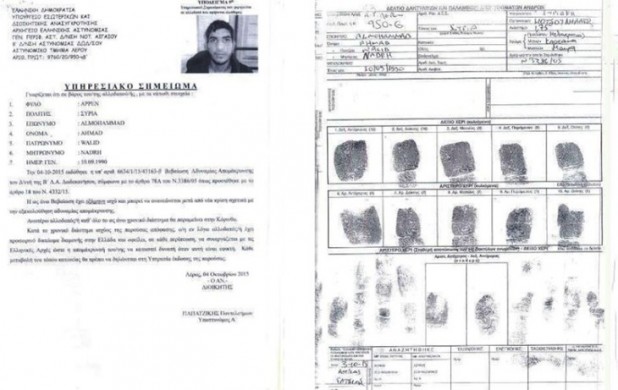
The fake passport trade epicenter is Athens, through which the vast majority of the invaders pass on their way to the rich pickings of western Europe.
The very first passport forger quoted by Kathimerini is a “Pakistani national and member of a criminal ring peddling forged identification and travel documents” whose telephone was tapped by Greek police who heard him discussing taking on new “clients” for his business.
From there on, the article contains a litany of references to Pakistanis and Middle Easterners, stretching all the way back to ISIS-occupied Syria, where genuine blank passports are issued, and which are, disturbingly, official, genuine documents.
As the article says: “In early October, 12 suspects from Pakistan, Egypt, Iraq, and Syria were arrested in Athens on charges of belonging to a criminal organization. According to the police, the suspects had set up a racket to smuggle migrants and refugees from Greece to western Europe. At least seven of the suspects are said to have been working in Athens and on Kos, one of the eastern Aegean islands that has been receiving the bulk of arrivals from Turkey over the past several months.”
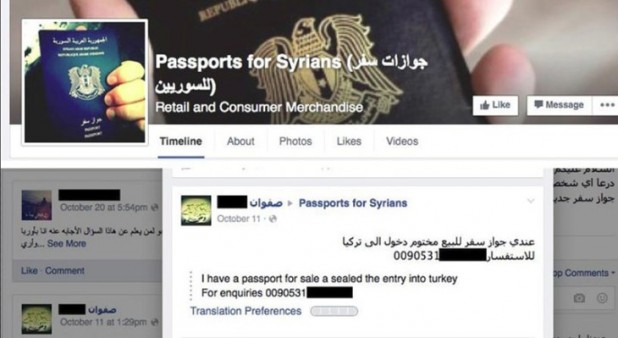
Kathimerini continues by telling of how its journalist spoke telephonically, “a few days after the terror attacks in Paris,” with a person named Safwan, who had set up a Facebook page to sell Syrian passports.
Safwan, as it turned out, lives in Gaziantep, some 300 kilometers from Raqqa, the headquarters of ISIS in Syria.
He assured the journalist—who was posing as a potential customer—that the passport was “genuine. The first page is clean. I haven’t changed the name or the stamps. If they check it on the computer, they’ll see it’s genuine.”
Safwan went on to explain that the passport had already been successfully used: “A guy has already come in and out of Turkey with this passport; it’s got stamps. It will look like a good passport and that counts.”
The extent of the Third World corruption—which makes none of these passports reliable in any sense of the word—then became apparent. Safwan said that the passport needed to be renewed by a government official, but this was no problem: “We have people who do that kind of thing. They renew it; we give them $100 and they add another entry stamp on top and you can get out like a gentleman.”
Safwan went on to guarantee that with this passport, the owner will definitely “reach Germany unhindered.”
The article then went on to quote “B.,” described as a “30-year-old Pakistani national,” who was released last year after serving a three-and-a-half-year sentence in a prison in Trikala, central Greece, for his role in an earlier forgery gang.
“B” has now, the article said, “returned to his old job in a small factory”—an indication that he is in Greece perfectly legally. This was confirmed by his admission that he had started in the forgery business “when he put up a compatriot in his home in the Athens neighborhood of Aghios Dimitrios.”
He revealed that the gang would alter genuine travel documents issued by European or other countries or “make passports from scratch, mainly appearing to be from Syria or Pakistan.”
In addition, he said, the forgers would create “clones” of documents issued to legally present nonwhite “immigrants” which were then sold to illegal newcomers for €800 each. These documents would be sold in Pakistani-run shops and kiosks in Athens, with the purchaser receiving instructions on where to pick up the papers by telephone or Facebook.
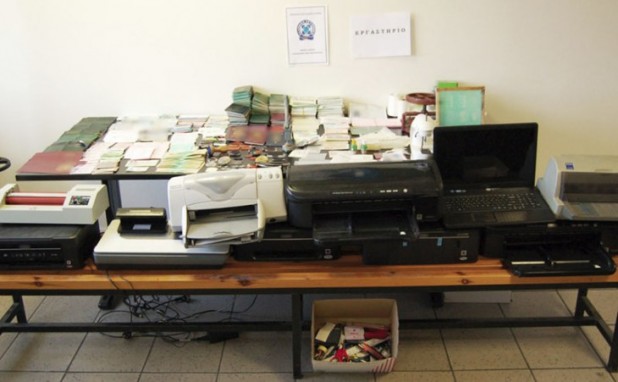
The forgers also use the postal service to ship large amounts of their fake documents around, the article continued.
In May this year, for example, two cardboard boxes from China arrived at Athens International Airport addressed to a minimarket in the suburb of Rendi.
When checked by customs officers, the boxes were found to contain 4,000 blank Greek (and therefore EU) residence permits, prepared, exactly as the real ones are, on adhesive paper so they could be affixed to passports.
These permits were professionally printed, and indistinguishable to all but the most expert analysis, from those issued by the Greek authorities.
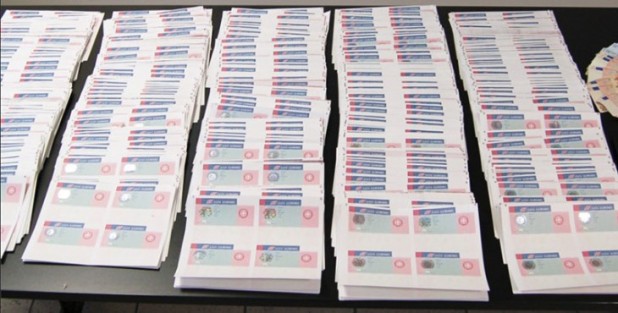
The fake residence permits were then delivered to the minimarket by a police officer posing as a courier service worker. Once delivered, the minimarket owner, described as a “41-year-old minimarket owner U.M. from Pakistan,” was arrested.
It turned out that the minimarket was actually a front for a massive illegal document ring, and when “U.M.’s” apartment was searched, a complete forgery workshop was discovered.
“U.M.” had lived in Greece for almost 20 years, and had spent the previous year “traveling between Athens and Malmo in Sweden, where he had another business,” the report revealed—indicating once again how widespread the Third World danger has become across Europe.
As Die Zeit admitted in its introductory commentary to the article: “An entire passport forging industry has been established in the immigrant neighborhoods.”
